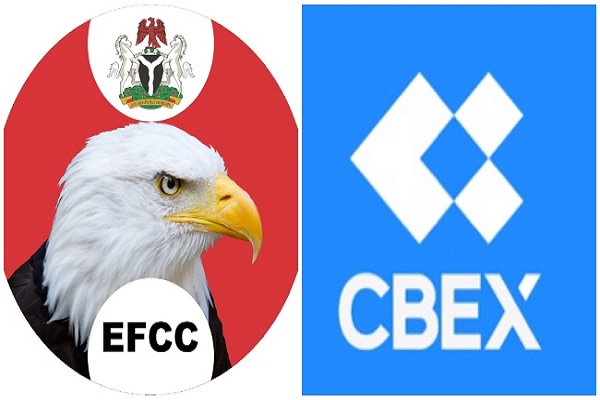
JUST IN: CBEX Investors to Recover Funds, EFCC Promises – Here’s What You Need to Know

The Economic and Financial Crimes Commission (EFCC) in Nigeria has made a bold assurance to investors who lost money in the CBEX platform, stating that they will get their funds back.
This announcement, shared via a post on X by The Nation Nigeria on April 16, 2025, has sparked a mix of hope and skepticism among the public.
The EFCC’s pledge comes at a time when financial scams in Nigeria’s private sector are on the rise, a trend that has been documented in various studies, including a 2022 report by the School of Oriental and African Studies (SOAS).
The report highlighted the EFCC’s shifting focus toward tackling fraud in private enterprises, a space increasingly plagued by Ponzi schemes and dubious investment platforms.
The image accompanying the post features the EFCC’s emblem—an eagle over the Nigerian coat of arms—alongside the CBEX logo, which consists of a geometric design in blue and white.
The CBEX logo hints at its nature as a digital trading or cryptocurrency platform, a sector that has frequently come under scrutiny by the EFCC in recent years.
Platforms like CBEX often promise high returns to lure investors, only to collapse and leave victims in financial ruin.
A related web result from BBC News Pidgin confirms this, noting that CBEX offered a staggering 100% return on investment within 30 days—a classic red flag of a Ponzi scheme.
The EFCC has since partnered with international agencies like Interpol and the FBI to investigate the platform, which reportedly crashed after defrauding numerous Nigerians.
Public reaction to the EFCC’s promise has been mixed, as seen in the replies to the X post. Some users expressed doubt, pointing to the agency’s past struggles with similar cases.
For instance, one user referenced the MBA Trading and Capital Investment Limited scandal, where investors reportedly lost over N171 billion.
According to a Sahara Reporters article, this case has dragged on for years, with investors protesting at the EFCC and Central Bank of Nigeria offices as early as 2021, demanding their money.
The lack of resolution in such cases has fueled skepticism about the EFCC’s ability to deliver on its latest promise regarding CBEX.
Another user sarcastically called the announcement a “super story,” reflecting a broader sentiment of distrust.
The EFCC’s credibility is further complicated by its handling of high-profile corruption cases, such as that of Yahaya Bello, the former governor of Kogi State.
As noted in a BBC News Pidgin report from November 2024, Bello faces charges of money laundering and criminal breach of trust involving N80.2 billion.
Despite the EFCC’s efforts, the case remains unresolved, with some X users demanding the agency’s chairman resign over this failure before they can trust the CBEX recovery promise.
This backdrop of unresolved cases paints a challenging picture for the EFCC as it seeks to reassure CBEX investors.
The broader context of financial scams in Nigeria adds another layer of complexity. The SOAS study from 2022 emphasized how the EFCC has had to adapt to the growing prevalence of fraud in the private sector, particularly with the rise of digital platforms.
However, the agency’s track record in recovering funds remains spotty, as evidenced by the MBA Trading case and others like it. For CBEX investors, the EFCC’s collaboration with international bodies offers a glimmer of hope, but the road to recovery is likely to be long and uncertain.
As Nigerians await tangible results, the EFCC faces the daunting task of rebuilding public trust while tackling the ever-evolving landscape of financial crime.


